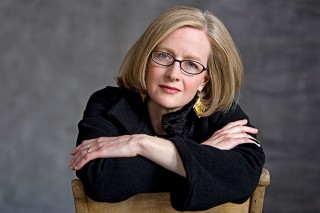Title

Anne Manson conducts the Juilliard Opera production of Janacek's Cunning Little Vixen.
(Photo by Dario Acosta)Janacek’s Cunning Little Vixen may well be the only opera ever inspired by what was essentially a comic strip. The basis for the composer’s seventh opera was a novel by Rudolf Tesnohlidek that originated as a serial commentary, created to accompany a series of charming animal drawings by artist Stanislav Lolek that appeared in the Brno (Czechoslovakia) daily newspaper during the spring of 1920. Janacek wrote both the music and the libretto, transforming the lighthearted tale into one of his most personal and profound artistic achievements. Juilliard Opera performs the work on April 28 and 30 and May 2.
Body
The basic storyline is simple: the Vixen (soprano Julia Bullock) is captured as a cub by the Forester (bass-baritone Aubrey Allicock); she later escapes, marries the debonair Fox (soprano Karen Vuong), and raises a family before meeting her demise at the hand of the Poacher Harasta (baritone John Brancy). The other main human characters include the Forester’s drinking companions, the Schoolmaster (tenor Martin Bakari) and the Priest (bass Onay Kose, who also plays the Badger). There are also several roles for children, which are being sung by Pre-College students.)
Janacek ingeniously uses details of the story to convey his philosophical perspective on man’s relationship to the natural world; Eric Chisholm, the author of The Operas of Leos Janacek, praised Vixen as “a sincere and touching tribute to mother-nature, an almost Buddhistic hymn in praise of the basic unity of all living creatures.”
Much of the opera’s considerable humor and charm comes from Janacek’s portrayal of the animals, who behave according to their nature—the Vixen kills chickens, for example, and drives the Badger out of his den by “marking” it—but who also display numerous humanlike characteristics and mannerisms: the Dog describes himself as a composer; the Badger smokes a pipe and threatens the Vixen with legal action; the Vixen and the Fox decide they have to get married when she suspects she’s pregnant.
The Vixen herself is surely one of opera’s most captivating heroines. Julia Bullock told The Journal she sees her character as “one of passion, some fury, sensuality, sensitivity, and honesty—but overriding all of that is her inquisitiveness. It’s her sense of wonder (and awe) that’s so electric, and that’s what draws individuals to her.” For Bullock, the most challenging aspect of the role is being able to “shift from mood to intention quickly and with ease. Janacek writes her music and her vocalism this way,” she said. “She’s never ‘stuck’ in a way of being—[she’s] always fluid, receptive, and impacted by her surroundings.” But the Vixen also “risks a lot because of her confidence, and that’s her demise.”
By contrast, the Forester and his friends are a melancholy group of men suffering from a lack of female companionship. The Schoolmaster is infatuated from afar with the gypsy girl Terynka (who never appears, but is revealed to be Harasta’s fiancée toward the end), while the Priest was betrayed by a young woman during his student days and hasn’t trusted anyone of her gender since. Director Emma Griffin, who mostly recently appeared at Juilliard directing Poulenc’s Les mamelles de Tirésias in December 2010, told The Journal, “one of the main differences between the humans and the animals is that the animals have no memory—no nostalgia, no regret—whereas the humans are burdened by it.”
The conclusion of the opera offers no escape from this burden for the Schoolmaster, who is left grieving over Terynka’s wedding, or the Priest, who has moved to another parish and written of his loneliness. The Forester, on the other hand, experiences an epiphany in which he accepts the Vixen’s death and his own advancing age as part of the continuing cycle of nature. Griffin described the final scene—“when the Forester ‘gets it,’ that the circle of life continues through you and beyond you” —as “one of the greatest moments of human transcendence in the Western canon.”
Explaining her decision to forgo animal costumes and elaborate scenery in this production, Griffin noted that the use of animal costumes is difficult for the singers in a physical sense “and for audiences because it immediately conveys ‘cutesy.’ In stripping away the sets and costumes,” she added, “my hope is to reveal the philosophical core of the piece—which expresses a world view that I find very close to home.”
As an interesting side note, the English translation being used for this production is by Yveta Synek Graff, an influential language coach and advocate for Czech opera who donated her prized collection of scores and archival materials to Juilliard in 2012. Asked about the connection between the donation and the decision to program the work this year, Brian Zeger, the artistic director of Juilliard’s Vocal Arts Department, explained that “Vixen is a piece I’ve loved for a long time and have wanted to do at Juilliard; I was just waiting for the right voices, which we have this year. Last year’s donation created a great buzz about Czech vocal music, and riding on this wave of expanded interest, the timing seemed perfect.”
Premiered in Brno on November 6, 1924, when Janacek was 70, the opera held a special place in the composer’s heart. The final scene was played at his funeral four years later, according to his wishes.





